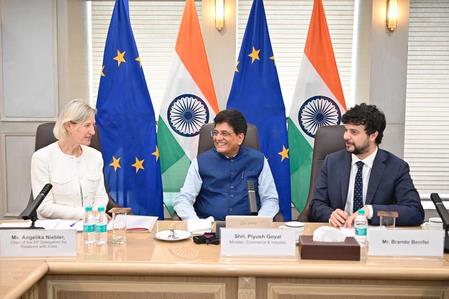
Significant Progress Made In India-EU FTA Talks: Piyush Goyal
Goyal met EU Commissioner Maros Sefcovic in Brussels for the FTA negotiations during his recent visit to Europe.
"We have made significant progress in this three-day discussion between EU Trade Commissioner Maros Sefcovic and his team in several areas," Goyal said.
The minister revealed that 10 out of 20 chapters of the proposed agreement have been closed, while another four to five chapters have been agreed to in principle.
The two sides are recognising mutual sensitivities and strengths and working in a spirit of partnership to promote trade, investments and technology flow, he added.
"When the EU Trade Commissioner visits India in late November, we will be able to make significant progress towards closure of the deal," Goyal said.
He highlighted that both sides are working towards a fair and reputable trade agreement, which will benefit businesses and consumers in India and the EU alike.
Echoing Goyal's remarks, Sefcovic wrote on X: "We've made substantial progress across a number of areas, including on further trade and investment facilitation."
The India-EU FTA, once concluded, is expected to deepen economic ties between the two major markets and open new avenues for trade, investment, and sustainable growth.
Summing up his official visit to Europe, which included Geneva for the UNCTAD four-year session, and Berlin for meetings with business leaders and think tanks. Goyal said that at UNCTAD, India demonstrated that it represents the Global South.
The Commerce Minister said that his engagements at the Berlin Global Dialogue and with European business communities showed growing global interest in India's expanding economy.
"More and more countries want to deepen relations with a resurgent, strong, and aspirational India as the country's growing consumer demand, fast economic growth, and focus on sustainable development are creating major trade opportunities,” the minister said.
He also said that India made its views clear on the Carbon Border Adjustment Mechanism (CBAM) and the talks are moving in the right direction. India views the EU's CBAM as a discriminatory and protectionist measure that threatens its exports, particularly in energy-intensive sectors. India argues that CBAM violates the principle of "common but differentiated responsibilities" for climate change and is seeking to counter it through a combination of negotiating with the EU, developing a domestic carbon pricing mechanism, and focusing on decarbonising its own industries.

Legal Disclaimer:
MENAFN provides the
information “as is” without warranty of any kind. We do not accept
any responsibility or liability for the accuracy, content, images,
videos, licenses, completeness, legality, or reliability of the information
contained in this article. If you have any complaints or copyright
issues related to this article, kindly contact the provider above.


















Comments
No comment